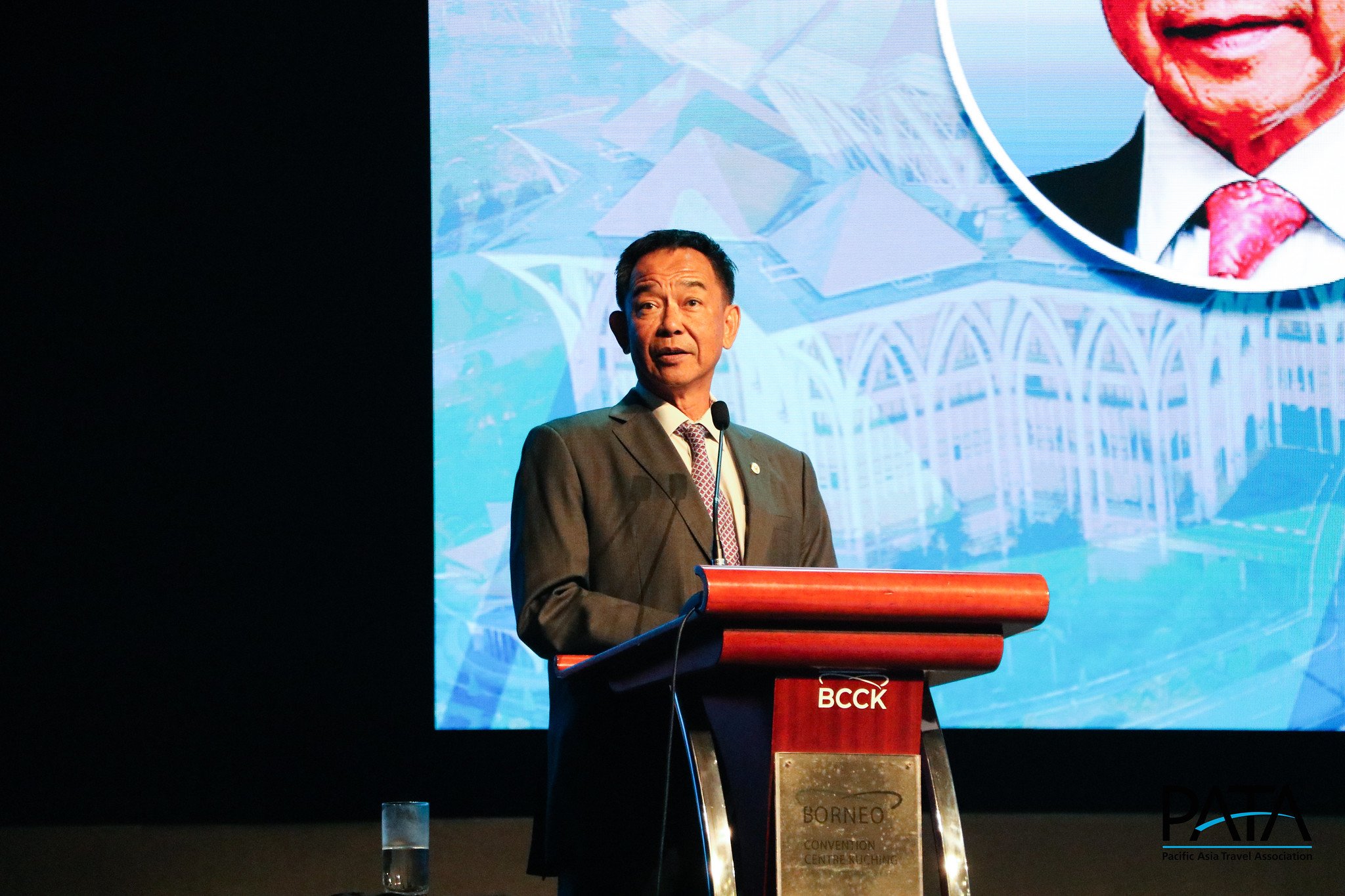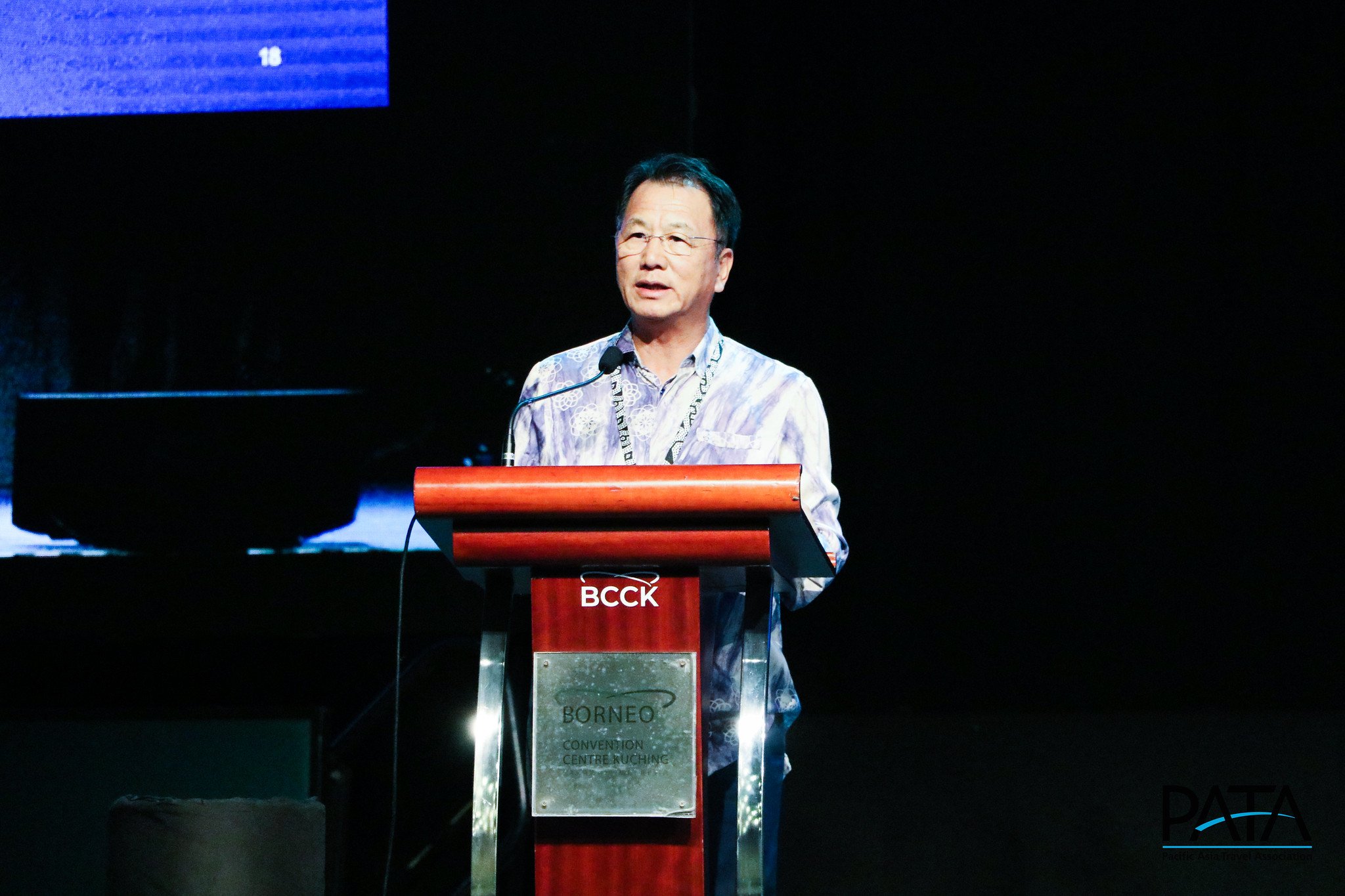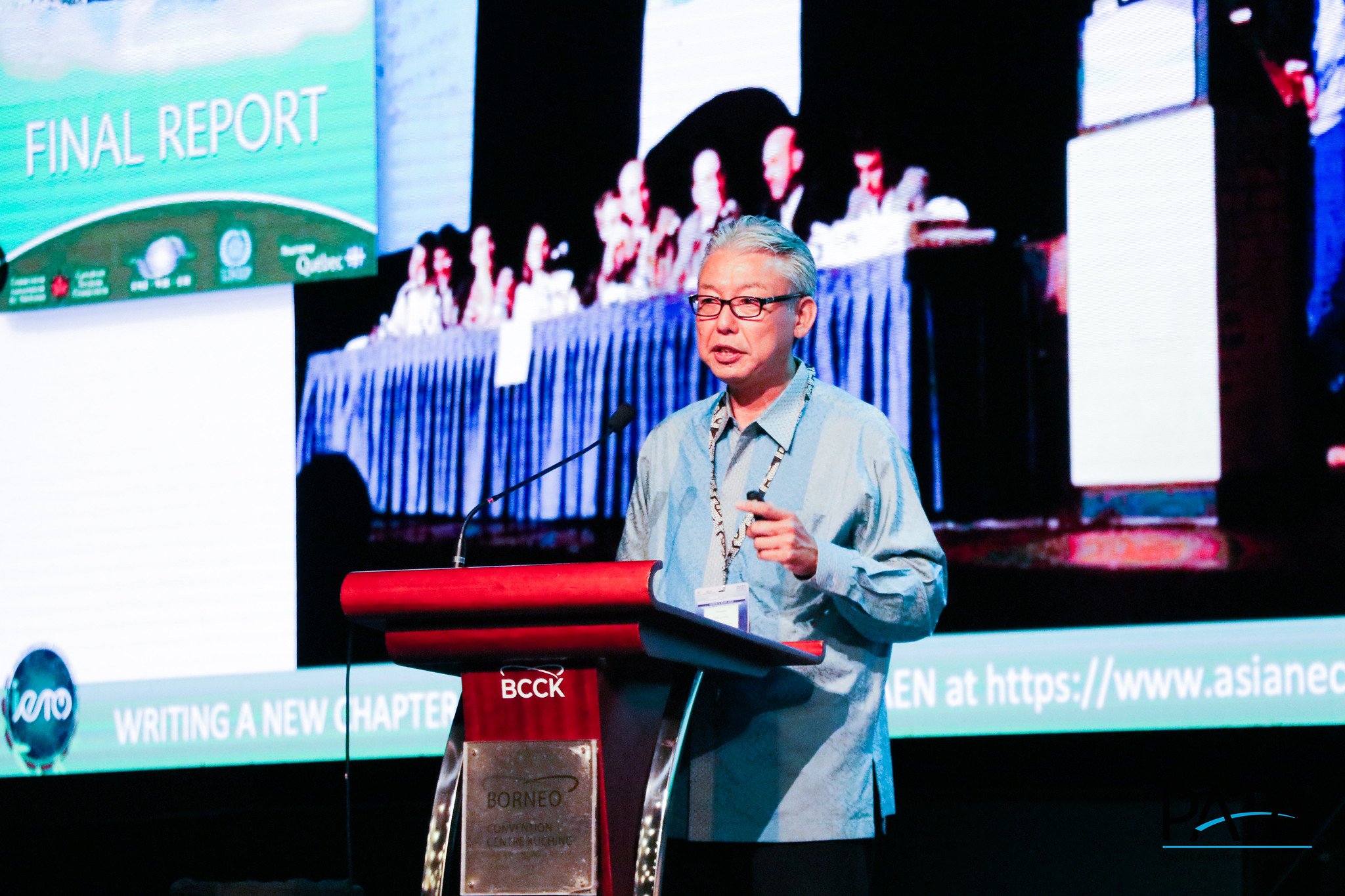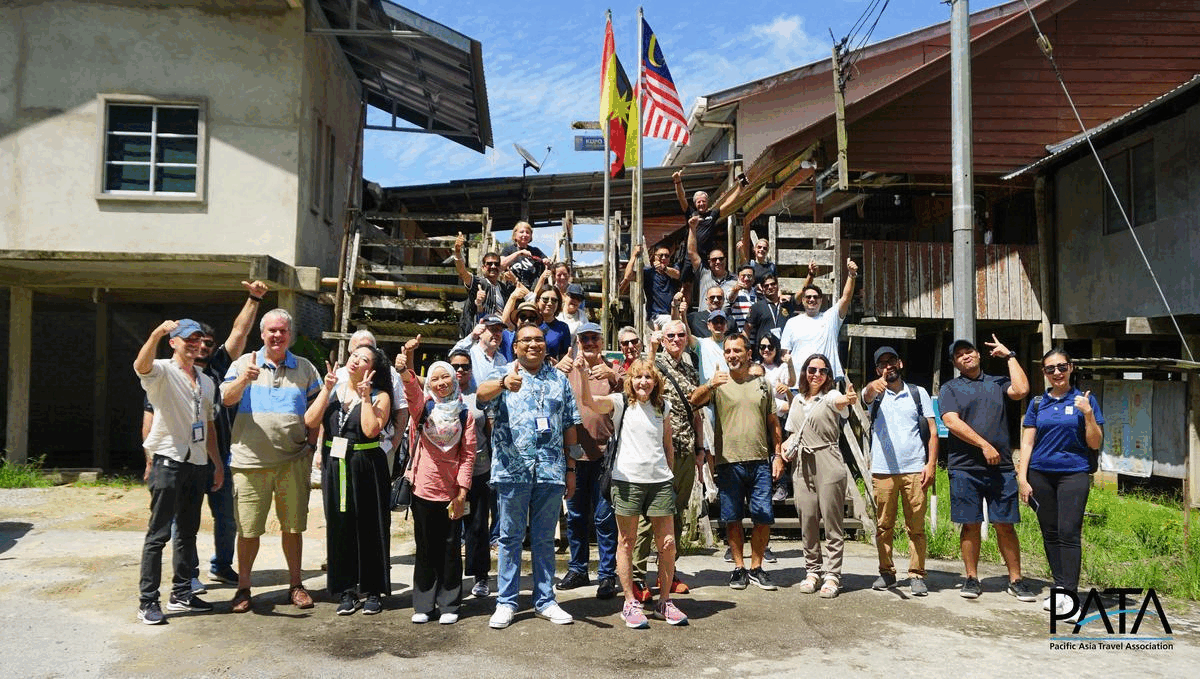Sustainability in Action: Key Takeaways from PATA Destination Experience Forum & Mart 2023
PATA Destination Experience Forum & Mart 2023, organised in collaboration with destination partners, the Ministry of Tourism, Creative Industry & Performing Arts of Sarawak, the Sarawak Tourism Board, and the Sarawak Convention Bureau, brought 272 delegates from 28 destinations to Kuching, Sarawak, Malaysia during the period of June 21-23.
The three-day event featured 11 main stage sessions, a two-day table-top tradeshow, and a half-day destination tour that allows the delegates to explore the iconic natural and cultural treasures of Sarawak including the Orangutan Sanctuary, Siniawan Old Town, Sarawakian cuisines, and more.
Take a sneak peek at the key takeaways from PDFM 2023 below.
YB Dato Sri Haji Abdul Karim Rahman Hamzah, Minister of Tourism, Creative Industry and Performing Arts Sarawak
“Welcome Speech”
In 2021, Sarawak became the first state in Malaysia to join the Global Destination Sustainability Index for Business Events and Tourism via the GDSI Partnership programme. To continue creating a resilient and thriving tourism industry, the Sarawak Government has set in motion the Post Covid-19 Development Strategy 2030 (PCDS 2030) and the Sarawak Tourism Master Plan 2035 prioritising ecotourism, community-based tourism, and eco-community hosts as strategic focal points. In partnership with the Sarawak Research Society, the Journal of Responsible Tourism (JRTM) was also launched to further spread the eco-tourism message.
Natalie Kidd, Managing Director Asia, Intrepid Travel
“Sustainability in Action”
Sustainability is a journey that is constantly evolving as we learn to know more about what we can do and what we can do better. It is a purpose-led business’s responsibility to educate its customers, even if it’s at a speed of one step at a time. It is important to consider the long-term economic feasibility of the “sustainable tourism” plan before reaching out to the communities. It is also essential to partner with local organisations that are impactful at the grass-root level, so they can engage the local communities and show consumers convincing proof that they could also create impacts through joyous, uncompromised travel.
L/R: Paul Pruangkarn, Chief of Staff, PATA; Thoyyib Mohamed, CEO & MD, Visit Maldives; Datuk Musa Hj. Yusof, Deputy DG (Promotion), Tourism Malaysia; Peter Christiansen, Director of Operations, Discova
“Climate Action Strategies for Destinations & Operators”
The panel's conversation centred around climate change and the role of tourism in mitigating its effects. Discussion points included the importance of local community initiatives, using storytelling as a tool for climate awareness, eliminating single-use plastics through actively offering solutions and integrating sustainability into daily operations. It is also important to remind the community that they should not change their offerings to accommodate the visitors, and that the operators bringing in the visitors should make sure the selected visitors are aligned with the destinations to create the best outcome. The panel agreed that both policies and private sector initiatives are essential in climate action.
Celine Wickerhoff, Director of Business Development, APAC, Expedia
“Global and Asia Pacific Travel Market Trends & Insights”
As most borders have reopened without restrictions, inbound travel to APAC destinations is seeing, on average, 25% longer trip durations, 5% longer stays, and more than 30% booking 3+ months in advance. Intra-regional travel within APAC travellers is also growing faster than inter-regional travel at 345% Y-o-Y. Travellers are now looking at more flexible, inclusive, and sustainable options; 70% will choose inclusive travel options even if at a higher cost, and 50% of consumers are willing to pay an additional 38% more for sustainable travel options. Travellers are also leaning towards businesses with loyalty programmes; 44% of the surveyed are members of a loyalty programme and 53% will consider booking with providers that they are a loyalty member of over those that they are not.
L/R: Peter Semone, Chair, PATA; Sharzede Datu Hj. Salleh Askor, CEO, Sarawak Tourism Board (STB)
“Recalculating the Measurements of Success”
Measuring tourism in a more scientific way indicates that the numbers of visitor arrivals need to be accompanied by a consciousness of sustainability. That said, the roadmap for sustainability needs to be consistent, crystalised, and with clarity so the value and belief are aligned among all stakeholders, in turn, encouraging willingness to invest in the efforts. Taking Rainforest World Music Festival as an example, the event started out as a platform to preserve culture, now it is used as a vehicle for visitors to learn and appreciate responsible travel efforts. Though it may not be the biggest music festival, it certainly provides much more meaningful experiences for the visitors compared to the numbers.
Harry Hwang, Director, Regional Department for Asia and the Pacific, UNWTO
“Tourism’s Role in Development”
In the “Accelerating Transformation” era where resilience, inclusivity, and sustainability are the future, UNWTO has been pushing the industry to work toward the goal through a number of initiatives including the Statistical Framework for Measuring Sustainability of Tourism (MST) that provides a roadmap from global to subnational level to examine tourism from environmental, social, and economic perspectives, UNWTO International Network of Sustainable Tourism Observations and Best Tourism Villages Initiative that facilitate exchange and stimulates development, and various Declarations and Pledges that connects private and public sector to work towards the same goals.
L/R: Paul Pruangkarn, Chief of Staff, PATA; Audra Morrice, Masterchef Asia/ Singapore Host & Judge, Cook, Author, Australia; Karen Shepherd, Strategic Director, UNESCO Creative Cities Network, Kuching, City of Gastronomy
“The Power of Gastronomy Tourism for Destinations”
The social and economic impact of gastronomy tourism beyond the farm-to-table chain includes the transformative influence of urban food chains and the positive effects on the younger generations– countering the effects of globalisation and capitalism by reconnecting them with their culinary roots and fostering a holistic understanding of their ecosystem.
Education and campaigns are effective tools for promoting gastronomy tourism, with the entire experience viewed as an educational process that attracts visitors while promoting local produce. Gastronomy is also recognised as a vehicle for equality, involving entire communities in tourism projects centred around food and culture and using gastronomy tourism as a means to support their current careers without the need to change their way of living. International recognition, such as the Michelin stars, might not be able to reach the smaller food businesses, it is nonetheless a means to give the broader food provider scene more visibility.
Randy Durband, CEO, Global Sustainable Tourism Council (GSTC)
"Walk the Talk: Systematic Approaches to Sustainable Tourism"
The systematic approach to sustainable tourism entails attributes, measurement, and verification. It involves setting realistic targets and timelines for businesses and destinations to gradually improve their sustainability practices. Compared to other sectors, the tourism industry is vulnerable due to loose verification; to address this, a robust verification system such as GSTC’s Accreditation Programme is necessary, which includes training, awareness, and a reliable certification process.
It is also important to understand the levels of verification. It goes from zero verification to 1st party assessment which is most likely an internal guidance system, then 2nd party verification where the impartiality might be unclear, and finally 3rd party certification by an accredited certification body.
Chelsea Tan, Sales Director - APAC, Sojern
“Using Digital Marketing to Drive Sustainability”
Digital marketing plays a crucial role in raising awareness for sustainable tourism and influencing travellers to make more environmentally conscious choices. One approach is to use audience marketing techniques to promote brands and reach the right audience that does consider sustainable travel options and provide online tips to educate consumers who are less aware of the subject. Collaborating and pooling digital marketing efforts with local businesses and Destination Marketing Organisations (DMOs) can amplify the impact. Another aspect is empowering local residents with digital knowledge, enabling them to participate actively in promoting sustainability.
Leveraging New Trends in Sustainable Forms of Tourism
Masaru Takayama, Founding Chair, Asian Ecotourism Network
“New Trends in Ecotourism”
On top of carrying out activities in natural areas that sustains the environment and local people’s living, ecotourism should also create knowlecdge and understanding through education for all involved. Rising along the popularity of ecotourism are issues like uncontrolled ecotourism groups, staged nature experience, unverified claims of sustainable hotels, as well as the emergence of social media encouraging people to flock to destinations. To solve these negative “trends”, it is important to have guidelines and educations in place for all those involved.
Hannah Pearson, Regional Director APAC, Adventure Travel Trade Association
“Adventure Travel Trends in Asia Pacific”
Adventure travel encompasses activity, culture, and nature, extending beyond nature-based activities. The impact of adventure travel in the Asia Pacific region is noteworthy, with 65% of revenue remaining within the community, and visitors often staying longer. Asia Pacific's cultural richness provides a unique advantage in cultural tourism compared to other regions that prioritize nature and activities. With many destinations in the region transitioning towards quality tourism and responsible travel, adventure tourism can address pre-pandemic issues by dispersing visitors and diversifying source markets. Twinning opportunities, pairing destinations together, offer a means to meet rising demand without engaging in direct competition between destinations.
Karma Lotey, CEO, Yangphel Adventure Travel
“Wellness Tourism and the Rise of Sensory Nature Activities”
Wellness tourism is more than just spa and yoga, it is associated with the pursuit of maintaining or enhancing one’s personal well-being. Sensory nature activities are activities where the visitors participate in the communities’ returning to ancient traditions and appreciation of the cultural “relics”. Sensory nature activities have been seen to encourage slower travels and longer stays among visitors, simultaneously, reengaging the community with their traditions and providing them extra income without having to change their lifestyle.
Some other happenings at the event include:
Destination Experience
1:1 Table-top Travel Mart
Welcome Dinner hosted by Ministry of Tourism, Creative Industry & Performing Arts Sarawak
The 3-day event brought together delegates from the public and private sectors for inspiring and insightful discussions on some of the major issues in marketing and managing tourism growth as the travel and tourism industry looks for new opportunities to promote sustainability within the industry. Check out more event photos here >
Thank you to the event sponsors, partners, delegates, and buyers and sellers that made this event possible. See you all at our next event in New Delhi, India - PATATravel Mart!
The PATA Destination Experience Forum & Mart 2023 was generously hosted by the Ministry of Tourism, Creative Industry & Performing Arts of Sarawak, Sarawak Tourism Board, and Sarawak Convention Bureau with support from Lunch Sponsors, Tourism Malaysia and the Sabah Tourism Board; Session Sponsor, Expedia Group Media Solutions; and Event Tech Partners, Cvent and the Thailand Convention and Exhibition Bureau (TCEB).
















